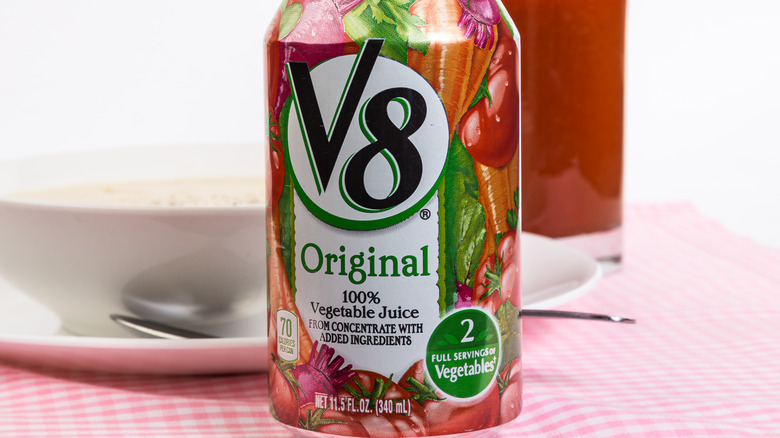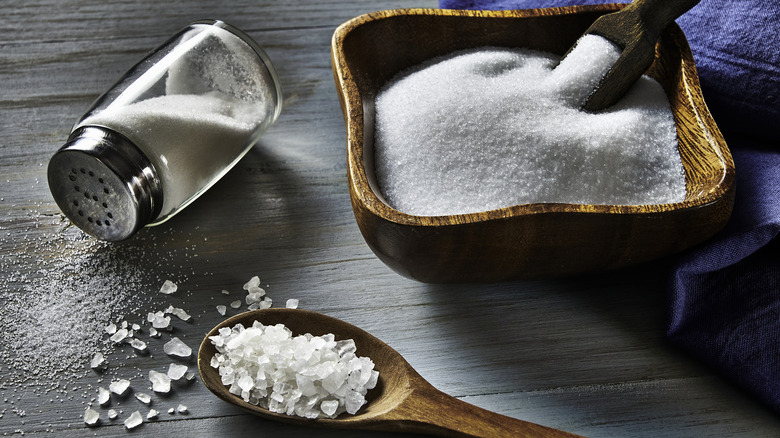How Much Salt Is Really Hiding In Your V8 Juice?
Whether you add salt to your foods or enjoy the salty taste of a good french fry or potato chip, most Americans get too much sodium in their diets. Too much sodium can increase your blood pressure and your risk for heart disease and stroke (via Harvard School of Public Health).
Surprisingly, even if you've abolished your salt shaker and shy away from salty snacks, a lot of foods and drinks have sodium to help improve their flavor. Some of these foods and drinks might not taste salty, but you might be surprised at the sodium content of many processed foods. Smoked and processed meats are high in sodium, but so are some canned foods like ravioli. Quick breads, instant pudding, and salad dressings will also have a good bit of sodium added. Even if you're trying to increase your vegetable intake, canned vegetables and vegetable juices are also high in sodium (via UCSF Health).
V8 juice is healthy, but high in sodium
V8 vegetable juice gives you 20% of your daily vitamin A and 80% of your vitamin C, and you can check off two of your daily vegetables with a serving of V8. That's a lot of nutrition in a 45-calorie serving. V8 gets its name from the juices of eight vegetables: tomatoes, carrots, celery, beets, parsley, lettuce, watercress, and spinach, so you won't see any added sugars in a V8. However, you might want to take note of the high sodium content in a V8. An 8-ounce serving of V8 vegetable juice has 640 milligrams of sodium, which is about 28% of the recommended upper limit for sodium per day.
If you're trying to reduce your sodium intake, you could try V8's low-sodium vegetable juice. You'll get the same amount of vitamins A and C in the original, but you'll only get 140 milligrams of sodium. That's just 20% of the sodium in the original V8. Plus, unlike the original V8, the low-sodium offering has 850 milligrams of potassium. Potassium is an important counterpart to sodium because it's responsible for the fluid balance within your cells, according to the Harvard T.H. Chan School of Public Health.
Sodium is good for you in moderation
Salt isn't just a popular flavoring; it's also a great preservative for foods. Ancient Egyptians used salt to preserve food without refrigeration because it pulled out the moisture that could make bacteria thrive. You need about 500 milligrams of sodium every day to sustain body functions in your nerves and muscles, according to the Harvard T.H. Chan School of Public Health. The iodine added to iodized salt is key for your body to produce the thyroid hormone. Without this mineral, you could experience constipation, problems with thinking, fatigue, or cold sensitivity.
Sodium is also important to keep your hydration levels balanced. You might notice after a salty meal that your body is retaining water. However, problems can occur if you drink too much water without electrolytes like sodium, magnesium, and potassium. Hyponatremia occurs when your blood has too little sodium, typically after drinking too much water. Although hyponatremia has often been associated with recreational athletes who drink too much water during an event, it can also occur if you're taking nonsteroidal anti-inflammatory drugs, antidepressants, or SSRIs. You could also be more at risk for hyponatremia if you have a low-sodium diet (per the Korey Stringer Institute). In this regard, endurance athletes who lose a lot of sodium through excess sweat might benefit from having a V8 (via USA Today).



